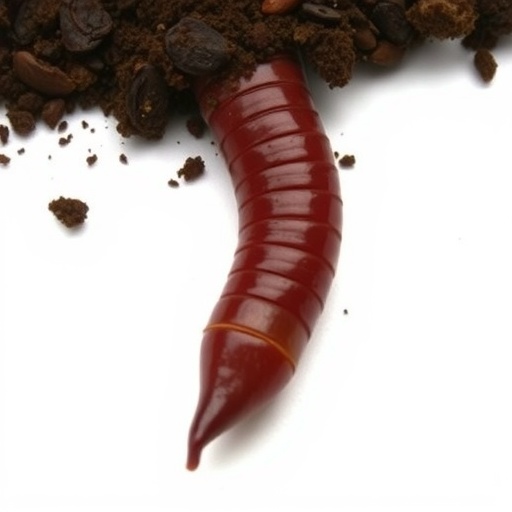In a groundbreaking study by Méndez López et al., published in the esteemed journal Environmental Science and Pollution Research, researchers delve into the intricate relationship between vermicomposting and earthworm reproductive behavior. Focusing on the nutritional variations found in vermicompost derived from an assortment of organic waste mixtures, this research sheds light on both ecological and agricultural implications. Given the increasing concern surrounding waste management and sustainable agriculture, this study is a significant contribution to the field.
Vermicomposting, the process of using earthworms to break down organic waste, has garnered attention as a viable solution to waste reduction and soil enhancement. As urbanization accelerates and food waste continues to mount, understanding the nutritional profile of vermicompost becomes crucial. The study examined various organic waste mixtures, highlighting how these differences can affect the quality of the resultant vermicompost. Utilizing a range of organic substrates, the researchers analyzed how each impacted nutrient composition and, subsequently, earthworm behavior.
The researchers’ methodology was thorough, employing different types of organic waste that are commonly encountered in agricultural practices. These included kitchen scraps, agricultural residues, and even specific industrial by-products. By varying the combinations and ratios of these materials, the research aimed to discover optimal conditions for producing high-quality vermicompost that can enhance soil health and support robust earthworm populations.
Key findings from this study indicated that the nutritional content of vermicompost varied significantly based on the organic constituents utilized in the mixtures. This nutritional variation has direct implications for earthworm reproductive behavior. For instance, the data showed that certain organic waste combinations led to an increase in reproductive rates among earthworm populations. This correlation highlights the potential for farmers and agriculturalists to optimize their waste management practices, enhancing not only soil fertility but also the health of earthworm communities.
Earthworms are often considered bioindicators of soil health, making their reproductive behavior an essential parameter to study. The ability to enhance earthworm populations through improved vermicomposting practices opens up new avenues for sustainable agriculture. As earthworms contribute to nutrient cycling and soil aeration, an increase in their numbers can lead to healthier ecosystems and more productive agricultural systems.
Furthermore, this research emphasizes the importance of a tailored approach to organic waste management. The idea that not all waste mixtures are created equal can inform how communities and farmers manage organic materials. By understanding which combinations yield the best nutritional profiles for vermicompost, stakeholders can make informed decisions that align with both environmental sustainability and economic viability.
The implications extend beyond mere composting; they touch upon broader themes of environmental stewardship and sustainable practices. By investing in research that promotes the efficient recycling of organic materials, societies can reduce their carbon footprints and limit the adverse effects of waste. This study not only reveals potential practices to improve agricultural outputs but also addresses the pressing need for responsible waste management strategies.
In addition to practical agricultural applications, the findings resonate with those interested in the science of soil health. With global soil degradation becoming an increasingly serious concern, understanding how to enhance soil through natural amendments like vermicompost is more important than ever. This research illustrates a successful intersection of science, agriculture, and ecological responsibility, providing a roadmap for future studies and applications.
Moreover, the study opens doors for innovations in urban composting initiatives. As cities continue to grapple with waste management challenges, effective vermicomposting can offer a method for urban areas to minimize organic waste while reaping the benefits of improved soil health. These insights can lead to community-based efforts that support urban gardening and local food systems, encouraging individuals and communities to engage in environmentally friendly practices.
Looking ahead, further research could explore the long-term impacts of different vermicomposting strategies on ecosystems. The understanding that the nutritional quality of vermicompost influences earthworm behavior is just the beginning. Future studies could investigate how these dynamics play out across different ecosystems, climates, and types of organic materials, expanding the horizon of academic inquiry in this field.
In conclusion, the research conducted by Méndez López et al. signifies a substantial advancement in our understanding of vermicomposting and its ecological implications. As the world seeks sustainable solutions to food production and waste management, insights from this study will likely inform future practices in agriculture and waste recycling. Promoting a shift toward enhancing soil health through innovative and scientifically backed methods stands to benefit not just the agricultural community but society at large in an era increasingly defined by environmental challenges.
The commitment to ongoing research in this area promises to yield even deeper insights, propelling the movement toward sustainable agricultural practices and responsible organic waste management. Those engaged in studies related to soil ecology, waste management, and sustainable agriculture will find these findings relevant as they navigate the complexities of environmental stewardship in the modern world.
Subject of Research: Nutritional variation of vermicompost and earthworm reproductive behavior
Article Title: Nutritional variation of vermicompost obtained from different organic waste mixtures and its influence on earthworm reproductive behavior
Article References:
Méndez López, A., Sánchez Vega, M., Leal Robles, A.I. et al. Nutritional variation of vermicompost obtained from different organic waste mixtures and its influence on earthworm reproductive behavior. Environ Sci Pollut Res (2025). https://doi.org/10.1007/s11356-025-37048-1
Image Credits: AI Generated
DOI: 10.1007/s11356-025-37048-1
Keywords: vermicomposting, organic waste, earthworm reproduction, soil health, sustainable agriculture, environmental stewardship, composting practices, nutritional quality, waste management




